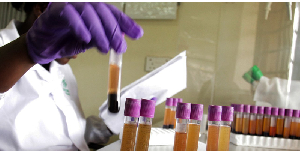Regional News of Friday, 27 March 2015
Source: GNA
ILGS launches Centre for Geospatial Intelligence Services
The Institute of Local Government Studies, which aims at building capacity for local governance, on Thursday launched the Centre for Geospatial Intelligence Services (CGIS) and the Local Governance Observatory (LGO).
The CGIS is an Institute of Local Government Studies (ILGS), state-of-the-art facility, aimed at delivering solutions for local government in all three areas, that is, service delivery, public policy and governance and public information and community engagement.
Speaking to the Ghana News Agency (GNA) at a Media launch in Accra, Mr Charles Yeboah Siaw, officer in-charge of Operations at the Centre, said the new facility offered by the ILGS specializes in Geographic Information Systems (GIS) and related assignments in land management, physical environmental management, environmental assessment and monitoring training.
“CGIS will also focus on GIS training and research, mapping and surveying, Geospatial property valuation and rating automation as well as monitoring local governance using geospatial technology,” he said.
Mr Yeboah Siaw noted that the Centre, equipped with the state of the art equipment and a rich pool of expertise for its assignments, would use advanced analytical tools to explore at a scientific level the spatial relationships, patterns and process of cultural, biological, demographic, economic, geographic and physical phenomena.
“This is the aspect CGIS-LGO is loyal to devote its strength, skill and experience to deliver, making data of the assemblies communicate well and foster discussion which may lead to good and easy understanding and effective decision,” Mr Yeboah Siaw told the GNA.
Speaking on the theme; “Accelerating Local Governance through GIS Technologies, Dr Abdulai Darimani, Acting Director, ILGS, said the theme was significant as it underscored the continued collective resolve and commitment to work together to accelerate the pace of decentralization and local governance.
“Secondly, the theme highlights our firm belief in the critical role of GIS technologies in accelerating the pace of decentralization and local governance in Ghana,” he said.
According to Dr Darimani, geographic information technologies were critical to the day -to- day management as well as the short-to-long-term planning and development decisions adding that “They provide data information which are valuable for objective and accurate decisions with respect to the location and material resources institutions”.
He stressed that geographic information helped institutions and individuals to act in reference to the needs of other actors and ecology and therefore lauded ILGS for a laudable initiative that marked the beginning of technology in mapping and surveying.
The acting Director therefore expressed ILGS’s readiness of providing excellent and competitive GIS services to local government and the public.
“The establishment of the Centre is part of the continued drive by the institute to expand the scope and improve upon the quality of its services to the public and local government”
“One of the key objectives of decentralization is to ensure effective and efficient service delivery and participatory development, our long years of experience working on decentralization and with local governments have shown that application of GIS technologies holds great potential for improving effective and efficient delivery as well as participatory development,” Dr Darimani said.
Mr Joseph Obeng Poku, Director of Policy, Ministry of Local Government and Rural Development, lauded ILGS for their positive efforts towards the country’s development, especially the local government sector.










